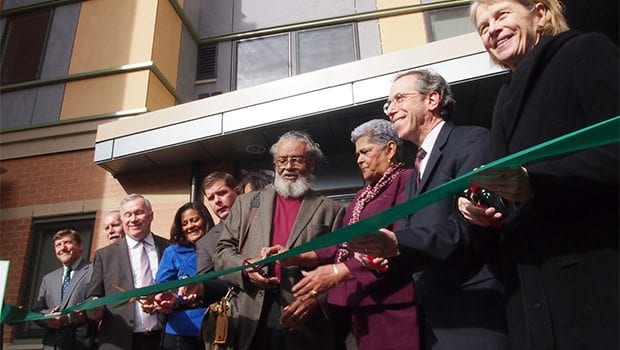

Madison Park Development Corporation recently completed 43 new units of affordable and market-rate housing on Dudley Street.
The Boston Housing Authority celebrated the completion of its $159 million HOPE VI redevelopment of the Orchard Gardens public housing development back in 1999. The project saw 331 units redeveloped over six years, with many of the brick row houses demolished and rebuilt as wood-framed town houses.
But the project was not over. As part of the HOPE VI grant, the Boston Housing Authority agreed to make publicly-owned land in the surrounding community available for housing development.
Last week the Madison Park Development Corporation cut ribbon on 43 new units of affordable and market-rate housing built on the last two vacant lots of that land, finally bringing the HOPE VI project to an end.
“Today marks the completion of that project,” said Madison Park Executive Director Jeanne Pinado.
With the BHA land, funding from federal, state and city coffers and private grants, Madison Park built the units in two five-story buildings at 207 and 225 Dudley Street, opposite the CDC’s offices in Hibernian Hall. The one, two and three-bedroom units house 118 residents, the last of whom moved in in September.
In addition to housing, the buildings have 2,715 square feet of commercial space on the ground floor. Along with Hibernian Hall, the new buildings have restored a strip of Dudley Street that for decades was an eyesore.
Back in 1993 when then-HUD Secretary Henry Cisneros visited Dudley Square during the application process for the HOPE VI grant, the neighborhood had been through hard times. The Orchard Park housing development had suffered under the rule of drug kningpin Darryl “God” Whiting during the 1980s. In the early ’90s, singer Bobby Brown was shot in front of the Biarritz Lounge, just steps away from the new homes.
“It’s been a long, long road,” said Dudley Square Main Streets Executive Director Joyce Stanley. It’s taken a lot of community work to make it happen.”
The development adds to the more than 1,300 units Madison Park has developed since it was founded in 1966 as the first community development corporation in the state.
Madison Park acquired the land from the Boston Housing Authority five years ago. Initially, the CDC worked to remove hazardous waste from the land, using a $500,000 Brownfields grant from MassDevelopment.
In attendance at the ribbon cutting was Mayor Martin Walsh, who recalled seeing construction begin on the site last year while he was campaigning for the mayor’s office. He noted that Madison Park partnered with organizations including the Massachusetts Minority Contractors Association to help ensure workers of color were hired on the job. Walsh said 50 percent of the workers on the job were people of color and 30 percent of were from Roxbury or the South End.
“You need everyone to step up,” Walsh said. “The result is you get a beautiful home.”







